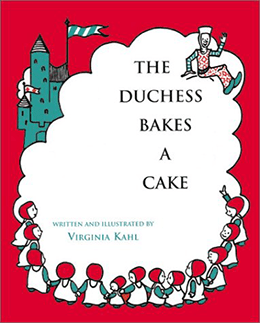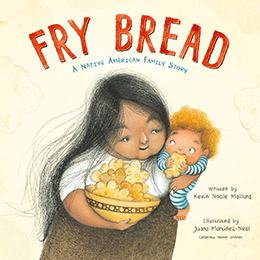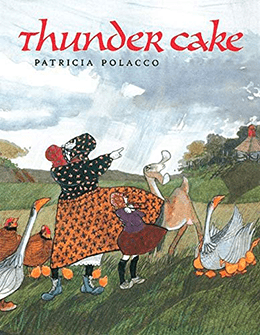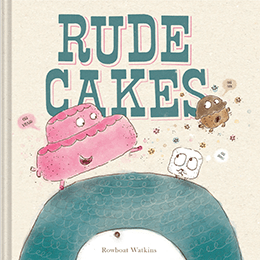Jackie: We decided to honor the nation’s newfound love of baking with a column on picture books focused on baking. We still don’t have libraries (a great benefit of this confinement is the reminder of how special and necessary are libraries in our lives) so we are limited to books we can find read aloud on Youtube. Let’s start with an old favorite.
 The Duchess Bakes a Cake by Virginia Kahl has been around since 1955. The Duke and Duchess live with their thirteen daughters: Madelyn, Gwendolyn, Jane, Catilda, Carolyn, Gwenevieve, Maud, Mathilda, Willibald, Genevieve, Joan, Brunhilde, and Gunhilde. One day the Duchess decides to bake a cake — a lovely, light luscious, delectable cake. She gives the cook the day off and begins to assemble. “Whatever she found she put into the batter.” And six times as much yeast for good measure. When the cake begins to rise the Duchess sits on top of it to tamp it down. But the lovely, light luscious delectable cake will not be stopped. Soon the Duchess is high in the sky, hoping for good weather.
The Duchess Bakes a Cake by Virginia Kahl has been around since 1955. The Duke and Duchess live with their thirteen daughters: Madelyn, Gwendolyn, Jane, Catilda, Carolyn, Gwenevieve, Maud, Mathilda, Willibald, Genevieve, Joan, Brunhilde, and Gunhilde. One day the Duchess decides to bake a cake — a lovely, light luscious, delectable cake. She gives the cook the day off and begins to assemble. “Whatever she found she put into the batter.” And six times as much yeast for good measure. When the cake begins to rise the Duchess sits on top of it to tamp it down. But the lovely, light luscious delectable cake will not be stopped. Soon the Duchess is high in the sky, hoping for good weather.
The longbowmen are ordered to shoot down the cake but hit only sparrows. The catapultiers, ordered to bring the cake down with boulders, “kept missing.”
Finally, little Gunhilde says, “I’m hungry.” And the solution is apparent. They will eat the Duchess down from the sky. She starts at the top. The others eat up from the bottom. And eventually all is righted again.
The story shows its age a time or two, especially when the Queen and the Duchess are forbidden to do any more baking. In our time we want the Queen and Duchess to decide that question. But it will always be fun to say, “A lovely light luscious delectable cake.” Even now it makes me hungry for the adventure of cake.
Phyllis: Kahl’s language and rhythm are so much fun. I have been walking around all day saying, “A lovely, light, luscious, delectable cake.” The words themselves are almost good enough to eat. I love, too, the long list of what goes into the cake: “In went the sugar and flour and butter. In went the almonds the raisins, the suet. She added some vinegar and dropped in the cruet…. She added some eggs, several dozen, well beaten, and some leftover pudding that they hadn’t eaten. Bilberries, gooseberries, cranberries, bog berries, blackberries mulberries, burberries, dogberries”… on and on. When it looks as though the children will have to say good-bye to their sky-bound mother, the hungry youngest of the thirteen daughters helps hits upon the solution.
 Jackie: Now for the brand new Fry Bread by Kevin Noble Maillard and illustrated by Caldecott Honor illustrator Juana Martinez-Neal. This lovely book, with its seemingly simple structure, carries a lot of meaning, and is a delight to read. Winner of the 2020 Siebert Award, it begins: Frybread is food. /Flour, salt, water, /Corn meal, baking powder, /Perhaps milk, maybe sugar. /All mixed together in a big bowl.”
Jackie: Now for the brand new Fry Bread by Kevin Noble Maillard and illustrated by Caldecott Honor illustrator Juana Martinez-Neal. This lovely book, with its seemingly simple structure, carries a lot of meaning, and is a delight to read. Winner of the 2020 Siebert Award, it begins: Frybread is food. /Flour, salt, water, /Corn meal, baking powder, /Perhaps milk, maybe sugar. /All mixed together in a big bowl.”
A new statement about fry bread begins each section in the book. Fry bread is sound. Fry bread is color. Fry bread is flavor, time, art. “Fry bread is history. /The long walk. The stolen land. /Strangers in our own world/With unknown food/We made new recipes/From what we had.” The illustrations are as arresting as the text. When “Fry bread is place,” we see kids romping on a gauzy but recognizable map showing the places named in the text.
Each of the sections gets its own explanation in the extensive back matter. Clearly fry bread stands for a lot for Kevin Noble Maillard and he brings readers to agree with him. I want to pore over the back matter in a way that YouTube really doesn’t allow. And for those who want to make fry bread after reading the book, there’s a recipe.
Phyllis:; When I first heard about this book, I thought about how fry bread was made foods the conquerors gave to the conquered, having taken away their own sources of food. So I was especially moved with how fry bread became a celebration of resilience, persistence, and inclusion. The book ends, “Fry bread is us.”
Just like fry bread is all sorts of colors — “golden brown, tan, or yellow, deep like coffee, sienna, or earth, light like snow and cream, warm like rays of sun”– so are the children pictured joyfully helping to make and eat fry bread. What better time than now to remember that “We strengthen each other/ to learn, change, and survive”?
 Jackie: We can’t do a column on cakes and baking without including Thunder Cake by Patricia Polacco. This book is all about love: the love and trust that the narrator has with her Babushka. And the love that the grandmother has for the child. Polacco shows it in the text and in the illustrations. The problem, as we all remember and the title reminds us, is thunder, “thunder that makes the windows shudder.” When the storm clouds appear the child heads for under the bed. But Babushka says, “This is thunder cake baking weather, all right. Looks like a storm coming to me.”
Jackie: We can’t do a column on cakes and baking without including Thunder Cake by Patricia Polacco. This book is all about love: the love and trust that the narrator has with her Babushka. And the love that the grandmother has for the child. Polacco shows it in the text and in the illustrations. The problem, as we all remember and the title reminds us, is thunder, “thunder that makes the windows shudder.” When the storm clouds appear the child heads for under the bed. But Babushka says, “This is thunder cake baking weather, all right. Looks like a storm coming to me.”
While they gather the supplies for the cake from Nellie Peck Hen and Kick Cow, the girl keeps track of the approaching storm by counting the seconds between the lightning and the thunder. This “ticking clock” keeps us turning the pages. Will they have time to bake the cake? What if they get caught outside when the storm hits?
Mile by mile the storm approaches, but they get the cake into the oven just in time. While it bakes Babushka reminds the narrator of all she has done and tells her how brave she is. When the cake comes out of the oven, they each have a slice and a cup of hot tea. Perfect reward for bravery. Perfect cause for joy. And for us, there is a thunder cake recipe at the end of the book.
Phyllis: This book is so rich in detail: the thunder that makes “the windows shudder in their panes,” Babushka lovingly fingering “the grease-stained pages to a creased spot,” three over-ripe tomatoes to put in the cake — something I plan to try with my next batch of over-ripe tomatoes in a few months. Grandma counts the distance of lightning differently than I learned as a child, but the countdown does make for a wonderful tension. And not only is the baked cake satisfying so is the little girl realizing she is brave after all.
 Jackie: One of the most surprising cake books is about an anthropomorphized cake who is rude. Rude Cakes (2015) is written by Rowboat Watkins, who says on his webpage that Rowboat is not his real name, but a nickname bestowed by his wife. But back to the story, “Rude cakes never say please. /And they never say thank you.” And we see a pink layer cake with legs saying “Gimme.” Rude cakes take things and they push others (whom they call “you clumsy crumb”) out of the way to get to the slide first. Rude cakes are obnoxious.
Jackie: One of the most surprising cake books is about an anthropomorphized cake who is rude. Rude Cakes (2015) is written by Rowboat Watkins, who says on his webpage that Rowboat is not his real name, but a nickname bestowed by his wife. But back to the story, “Rude cakes never say please. /And they never say thank you.” And we see a pink layer cake with legs saying “Gimme.” Rude cakes take things and they push others (whom they call “you clumsy crumb”) out of the way to get to the slide first. Rude cakes are obnoxious.
Still we are not quite prepared when a Giant Cyclops with a huge mouth reaches in Rude Cakes’ bedroom window and grabs the cake. “Giant Cyclops love…” we are told as its mouth opens wide. Page turn. “To wear cute hats.” It puts the cake on its head. Meanwhile the cake is saying, “I’m not a hat.” The Cyclops doesn’t hear. None of its cyclops friends hear these disclaimers, until Rude Cake says, “Please, I am not a hat.” Manners do make a difference.
Phyllis: This book made me laugh out loud. The art foreshadowed the giant Cyclops with a drawing hanging over the bed where the rude cake is jumping rather than settling down to sleep, but who would have suspected that giant Cyclops liked to wear jaunty little hats? And hats that dance, no less? This book gives me hope for all those who don’t listen, behave rudely, and think only of themselves.
Jackie: This is a delightful book. I would love to share it with kids. And I can imagine that neither of us would look at cake in the same way again.
Baking and reading, laughing and thinking, we will get through this time. And we hope we come out on the other side delighted by what we had taken for granted, grateful for so many kinds of gifts, and ready to share the good fortune we didn’t know we had. And ready for cake.
Phyllis: Yum!
